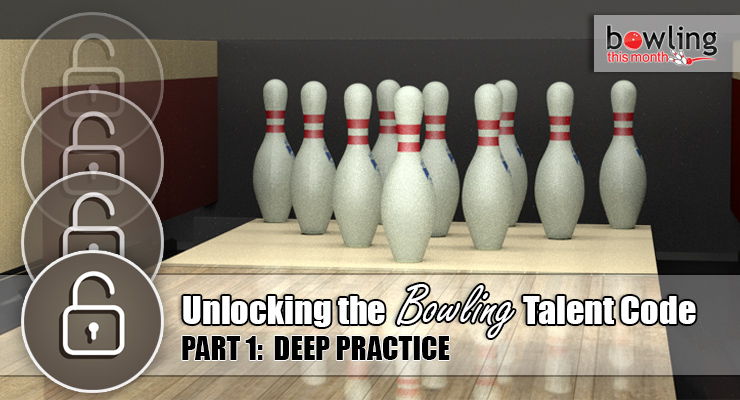Article Contents
- 1. Deliberate practice
- 2. Myelin
- 3. Deep practice
- 3.1. Chunking
- 3.2. Imitatsiya
- 3.3. The sweet spot
- 4. Conclusions
- 5. References
Note: This article is only available to Bowling This Month subscribers.
In his thought-provoking 2009 book The Talent Code, author Daniel Coyle scoured the world looking for breeding grounds of talent in sport, athletics, music, and the arts. He discovered that there were striking similarities in how skill was developed, the self-motivation of the individuals, and the methodologies of the coaches and instructors across these seemingly unrelated areas. In a series of articles for BTM, I will examine the three elements that Coyle found essential for the development of elite skill: deep practice, ignition, and master coaches. This first article in the series will focus on deep practice.
Before we proceed, I want to clarify the difference between “talent” and “skill,” as these words aren’t interchangeable. In the Merriam-Webster dictionary, talent is defined as, “a special ability that allows someone to do something well,” and skill is defined as, “the ability to do something that comes from training, experience, or practice.” These definitions suggest that skill is something that is developed, whereas talent is something that people are born with.
In recent years, researchers such as Coyle have tried to debunk the myth that people are born talented by looking at the amount of work elite athletes and performers have dedicated to mastering their domain. In this research, it has been consistently shown that no one has achieved elite levels of skill without putting in years and years of hard work, regardless of their initial ability.
Deliberate practice
The roots of deep practice originate in the research of Swedish psychologist K. Anders Ericsson, Professor of Psychology at Florida State University, and his groundbreaking 1993 article titled The Role of Deliberate Practice in the Acquisition of Expert Performance. Ericsson defines deliberate practice as follows:
“a highly structured activity, the explicit goal of which is to improve performance. Specific tasks are invented to overcome weaknesses, and performance is carefully monitored to provide cues for ways to improve it further.”
Ericsson makes it clear that practice for practice sake, endlessly repeating tasks that you have already mastered, will not improve performance over time.
There are four essential components of deliberate practice (which have been ...
Already a premium member? Click here to log in.


 (Only
(Only 